Subscribe to Our Newsletter
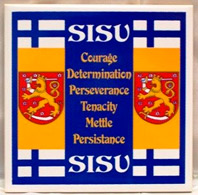

The Goddess Ma'at
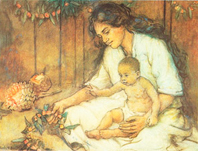
Malama
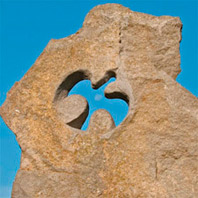
The Cathar Dove
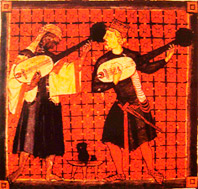
Troubadours
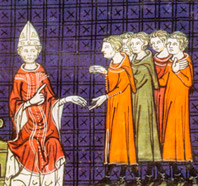
Pope Innocent III
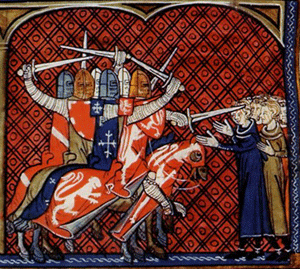
Albigensian Crusaders
Paratge Saga • Setting of the Paratge Saga • Upcoming Release for the Paratge Saga
The Meaning of Paratge
The word paratge (Pa-RAATCH or Pa-RAAGE-e) comes from the Occitan language that was widely spoken in the South of France during the high middle ages (1100—1350), the time of the troubadours ("trobadors" in their native Occitan).
This is also the time of the Cathars, a religious movement that appeared in the south of what we now call France in the 11th century and flourished during the 12th and 13th centuries.
Paratge is one of those wonderful words that defy translation because they express complex ideas, usually containing many subtexts of meaning – rather like matryoshka dolls: meanings nested within meanings.
Or, you might think of these words as lexicographic Roman candles, single words that explode multiple meanings on the mind. For this reason, we'll approach its definition obliquely by comparing it to other “Roman candle” words, from other peoples, that themselves contain some of the meaning of paratge.
Sisu
Often, such words describe the real or idealized nature of a people. For example, the Finnish word, sisu, which means a strength of character marked by the determination to persevere in the face of adversity. Perhaps a perfect example of sisu is the way the Finns nobly defended their sovereignty against the Russians in the “Winter War” of 1939-1940.
Time Magazine said, “The Finns have something they call sisu. It is a compound of bravado and bravery, of ferocity and tenacity, of the ability to keep fighting after most people would have quit, and to fight with the will to win. The Finns translate sisu as "the Finnish spirit" but it is a much more gutful word than that.”
There is certainly an element of sisu in paratge when you consider how the people of the south of what later would become France resisted the efforts of the northern crusaders to stamp out the Cathar religion, to confiscate southern property, and to annex entire regions like Languedoc, Gascony, Auvergne, Provence.
Ma'at
Another one of those nested words comes from ancient Egypt. It is Ma’at, which is both the personification of and the principle of truth, balance, order, law, justice, moderation and morality in the universe.
Human actions were deemed faithful to Ma’at if there was honesty and truthfulness among people and harmony within the society that was further reflected in a cosmic balance and the regularity of seasonal cycles and heavenly movements.
Ma’at expressed an underlying belief in the holiness and unity of the universe as opposed to isfet which represented chaos, lies and violence.
Indeed, as a goddess, Ma’at (pictured left) personified these attributes of harmony, justice and truth. In one hand, she holds a scepter (symbol of power) and in the other she holds the ankh (symbol of eternal life). An ostrich "feather of truth" adorns her head.
Ma’at weighed the heart (soul, really) of a dead person against her feather. If the soul was virtuous and not weighed down with blemishes, that person was awarded eternal life. Otherwise, not.
As with sisu, paratge also embodies many of the attributes of Ma’at with its notions of balance, right living, civility and honor. Also, paratge can be seen as the principle that can defeat its opposite of chaos, lies and violence. In fact, it would be fair to say that the main theme of the Paratge Saga is the eternal struggle between Ma’at and isfet.
Malama
The third of these “Roman candle” words is the Hawaiian word malama. It means to take care of, care for, preserve; to honor, to nurture. Inherent in the idea of caring or nurture – for people, for the environment – is respect, for without it there can be little caring.
How the notion of malama is applied can be seen from its companion concepts, pono and lokahi. Pono is goodness; it means to behave consistently in a spirit of goodness, uprightness, morality, excellence, well-being, equity, propriety, justice, virtuousness, fairness. Lokahi means unity and harmony in the community, which can only come through pono and malama.
Paratge
That brings us now to paratge. Elements of all the container words discussed above are also found in paratge. It appears to have arisen with the Cathars and shared by the Occitan inhabitants of the south of what would become France.
The Cathars were, above all, dualists or Gnostics, who believed in a good, creator god and his adversary, the evil god (similar to Ma’at and isfet?)
It was this evil god who created the earth we live on, thus it was the aim of the Cathars to eventually leave this life and join with the good god whom they identified as a non-corporeal Jesus Christ.
While in this world, however, the Cathars believed strongly in not adding to the evils but in ameliorating them through living in harmony.
They did not believe in killing, so they avoided foods that involved killing sentient beings. That they believed in peace is evidenced by the fact that one of their most powerful symbols was the dove.
The Cathars flourished in Languedoc and, given their views of the current world, it’s not surprising that the principle of paratge was fully expressed here.
The components of paratge are: honor, civility, tolerance, right living, balance, courtesy, excellence, grace and nobility of soul.
Honor: The worth or status of individuals or communities according to the degree to which their lives reflect the norms that they hold in great significance and value. For the people of Occitania, this meant the degree to which they adhered to the other principles of paratge.
Civility: Civilized conduct. Politeness towards others even when in disagreement.
Tolerance: Essentially, freedom from bigotry. To have a permissive and fair attitude toward others whose opinions, practices, race religion, gender or nationality differ from one's own. Occitania was famous for its tolerance. Indeed, the pope and the northern crusaders hated the people of Occitania precisely because of their tolerance of the Cathars who could usually find safe haven among Christian Occitans.
Right Living: Doing what is right because it is consistent with a higher set of values (such as paratge), rather than shunning what is right for immediate advantage, or simply because you can get away with it.
In today’s world this often takes the form of cheating.
At the time of the Cathars a legendary example of right living was when Saladin, on hearing that his enemy Richard III (Lionheart) lost his horse, sent him a replacement before resuming their war.
Balance: A state of equilibrium. The avoidance of excess. A condition of being in harmony with the universe. Ma’at.
Courtesy: In today’s lexicon, this would be seen as synonymous with civility. However in the time of the troubadours it had a more refined meaning, namely gentle politeness and courtly manners.
Indeed, the word comes from the 12th century French word courteis. As such, courtesy is related to chivalry, the medieval code requiring a knight to protect others who were unable to protect themselves, such as widows, children, and elders.
Cathars believed in the absolute equality of women (women as well as men could rise to the highest levels of their religion) and this attitude was reflected in the society of Languedoc as a whole.
Excellence: A talent, skill or quality that so surpassed the ordinary as to set a standard to which people could aspire. Among the Cathars, this could refer to the devotion with which they followed the principles of their religion. Among the Occitan people, it might refer to the advanced skills of horsemanship and swordsmanship required to defend against the northern crusaders.
Nobility of Soul: The refusal to yield to the forces of chaos or evil. To defend cherished virtues even when facing overwhelming odds. The Finnish concept of sisu, described earlier, is an example of nobility of soul.
The ferocity with which the Occitan lords opposed the northern crusaders in the 13th century is a powerful example of nobility of soul.
Grace: Elegance or beauty of form, movement or manner. The charm and courtliness of the troubadours was an expression of grace.
The Albigensian Crusade
The Cathars earned the bitter enmity of the Roman Catholic Church when they pointed out its ill-gained riches and its corruption and by arguing that the material world was created by an evil god, the god of the Old Testament.
Yet they considered themselves Christians because they believed Jesus was a spiritual manifestation of a benign god. Cathars wanted to return to the purity of the earliest days of Christendom.
At first, Pope Innocent III (pictured left) tried to suppress Catharism by sending monks to the South of France to preach against it. When this failed, Innocent declared a crusade against the Cathars and offered the lands of heretics and their to northern noblemen willing to answer the call of the crusade.
As some of the stories in the Paratge Saga will show, this so-called Albigensian Crusade led to the rape of Languedoc, the confiscation of the lands of southern lords, the total annihilation of the Cathars, and the subjugation of the southern lords to the French king. Also, the crusade paved the way for the brutal Inquisition.
Of course, the southerners mourned the loss of their lands and, in some cases, their loved ones. And no doubt they were terrified by the northern crusading knights, but what horrified them the most, it’s said, was the shocking realization that the northerners did not honor paratge. Instead, the northern knights promoted an ethic of acquisition through violence and the subjugation of the poor by the wealthy.
Such a thing was almost inconceivable to the people of the south.
We can only imagine what our world would be like if the southerners had won and paratge was the ethos passed on to us.
The Paratge Saga
The Paratge Saga is, at its core, about the struggle between good and evil, between Ma’at and isfet, between order and chaos, between love and hate… between life and death. In short, it’s about the eternal struggle between the forces of good and the forces of evil in whatever forms they take.
It is the opposition of the above elements of paratge to the forces that would deny them and produce hatred and chaos in the world.

